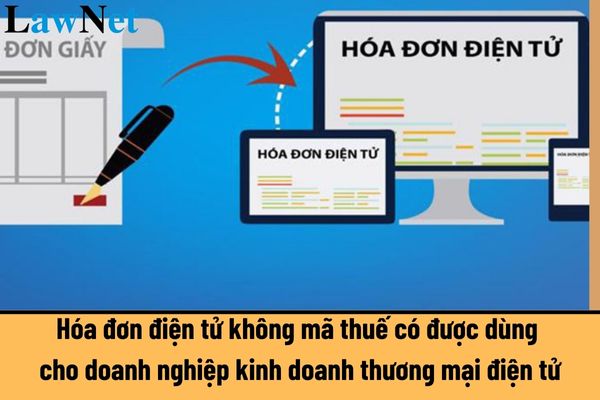Shall e-unauthenticated e-invoices be used for e-commerce businesses in Vietnam?
May unauthenticated e-invoices be used for e-commerce businesses in Vietnam?
Based on Clause 2, Article 91 of the 2019 Tax Management Law, regulations on the application of e-invoices when selling goods and providing services are as follows:
Application of e-invoices when selling goods and providing services
1. Enterprises and economic organizations use authenticated e-invoices when selling goods and providing services, without distinguishing the value of each sale or service provided, except for cases specified in Clauses 2 and 4 of this Article.
*2. Enterprises operating in the fields of electricity, petroleum, postal and telecommunications, clean water, financial credit, insurance, healthcare, e-commerce, *supermarket, commerce, airport, road, rail, sea, water transport, and enterprises and economic organizations that have or will conduct transactions with the tax authority via e-means, build IT infrastructure, have accounting software systems, and e-invoice software that meets the conditions for issuing, searching, and storing e-invoice data as regulated, and ensure the transmission of e-invoice data to buyers and tax authorities shall be allowed to use unauthenticated e-invoices when selling goods and providing services, without distinguishing the value of each sale or service provided, except in the case of high tax risk as prescribed by the Minister of Finance and cases of registration for using authenticated e-invoices.
3. Business households, business individuals particularly classified under Clause 5, Article 51 of this Law, and cases where revenue can be determined when selling goods and services, use authenticated e-invoices when selling goods and providing services.
...
Therefore, according to the above regulations, e-commerce businesses are allowed to use unauthenticated e-invoices when selling goods and providing services, without distinguishing the value of each transaction.
However, if e-commerce businesses fall under the category of high tax risk as prescribed by the Minister of Finance and have registered to use authenticated e-invoices, they must use authenticated e-invoices.

Shall e-unauthenticated e-invoices be used for e-commerce businesses in Vietnam? (Image from the Internet)
When shall the unauthenticated e-invoices be suspended from using in Vietnam?
According to Clause 1, Article 16 of Decree 123/2020/ND-CP, the use of unauthenticated e-invoices is suspended in the following cases:
- Enterprises, economic organizations, other organizations, households, and business individuals terminate the validity of their tax identification number;
- Enterprises, economic organizations, other organizations, households, and business individuals fall into cases where the tax authority verifies and announces non-operation at the registered address;
- Enterprises, economic organizations, other organizations, households, and business individuals notify competent state management agencies of the temporary cessation of business operations;
- Enterprises, economic organizations, other organizations, households, and business individuals receive notification from the tax authority about ceasing the use of e-invoices to enforce tax debt recovery;
- Instances where foreign invoices are used for selling smuggled goods, prohibited goods, counterfeit goods, and goods infringing intellectual property rights are detected and reported to the tax authority by functional agencies;
- Instances of issuing invoices for fictitious sales or service provision to defraud organizations and individuals are detected and reported to the tax authority by functional agencies;
- Cases in which the business registration authority or competent state agency requests businesses to temporarily cease conditional business operations when it is discovered that businesses lack the required legal conditions.
What are unauthenticated e-invoices in Vietnam?
Based on Article 89 of the 2019 Tax Management Law concerning e-invoices:
e-invoices
1. An e-invoice is an invoice with or without a tax authority code, presented as e-data issued by organizations or individuals selling goods or providing services. It records information on sales and services based on legal provisions on accounting and taxation via e-means, including invoices generated from cash registers connected to transfer e-data to tax authorities.
2. e-invoices include value-added tax invoices, sales invoices, e-stamps, e-tickets, e-cards, e-receipts, e-consignment notes, or other e-documents with different names.
3. An authenticated e-invoice is one that the tax authority codes before the selling entities send it to buyers.
The tax authority code on an e-invoice includes a transaction number that is a unique number generated by the tax authority system and an encoded character string by the tax authority based on the seller's invoice information.
4. An e-invoice without a tax authority code is an invoice issued by a selling entity and sent to the buyer without a tax authority code.
5. The Government of Vietnam provides detailed regulations for this Article.
Thus, an e-invoice without a tax authority code is an invoice displayed in e-data format issued by organizations or individuals selling goods or providing services that have recorded sales and service information and is sent to the buyer without a tax authority code.
e-invoices are generated via e-means, including instances where invoices are generated from cash registers with connections to transfer e-data to tax authorities.

